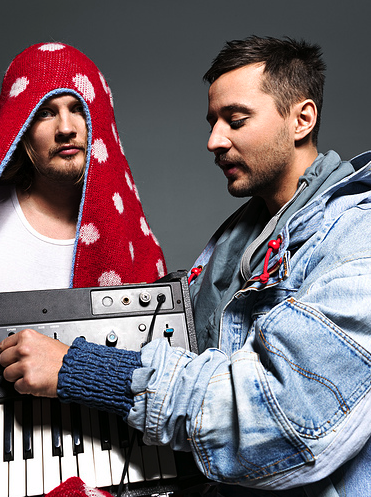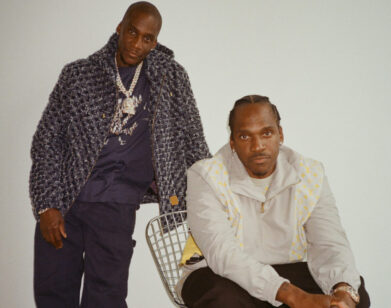Röyksopp’s Svein Berge Feels Free to Indulge

SVEIN BERGE (R.) WITH BANDMATE TORBJØRN BRUNDTLAND. PHOTO COURTESY OF STIAN ANDERSEN
“We got into electronic music at a very early age,” says Svein Berge, one-half of the Norwegian electronic duo Röyksopp with childhood pal Torbjørn Brundtland. “That’s not just bragging, or talking about, ‘Back in the days.’ I was emceeing when I was four years old. It was me and an 808.” Though his father’s Beatles, Stones and Abba records inform many of his earliest memories, Berge’s life changed forever when he first heard Kraftwerk’s “The Robots” playing as background music to a robot documentary on local television. Immediately, the kindergartner enlisted his older brother to buy the album (and was surprised with another by Jean-Michel Jarre).
“I didn’t understand how the sounds were made, and I somehow related that to the world of Star Wars and science fiction,” recalls Berge, who would made his parents take him to a local museum exhibition in Tromsø about the big bang so he could listen to the accompanying music by the Greek composer Vangelis. “Electronic was more magic than the other things, and I guess that’s where it all started.” By the time he was 12, he and Brundtland—who met playing video games and drawing portraits of one another at a friend’s house—had bought their first drum machine and two synthesizers.
Tonight, the Grammy-nominated knob-twiddling duo, who broke onto the scene in 2001 with the lounge sensation Melody AM, embark on a North American tour for their fourth studio album, Senior. If 2009’s hard-charging dance floor thumper Junior is a tab (or two) of ecstasy, this dense, instrumental comedown—which invokes everything from Spaghetti westerns (“Senior Living,” “Forsaken Cowboy”) to hypnotically attenuated tonal architectures (“A Long, Long Way”)—is a handful of Xanax. While some critics have given it a rough ride (“A whole LP of interstitials isn’t the sort of thing that can stand on its own”), Berge says it was never meant to be a commercial album. It may not even be destined for performance, as he told us during a near-fatal, pre-tour phone call from Scandinavia.
MICHAEL SLENSKE: How are you doing?
SVEIN BERGE: I’m doing fine, thanks. I’m crossing the street right now, trying to get myself killed. A car was just aiming at my hips but I managed to just slide over it.
SLENSKE: Well, try not get hit. I don’t want this interview to take on a different tone.
BERGE: [laughs]
SLENSKE: Let’s talk about Senior. Was this always meant to be your complement to Junior?
BERGE: Yes, it’s fair to say we initially had this idea to release a double album, with Junior being one side and Senior being the other, but then we just found it being too pretentious in so many ways; and we just felt that it was a bit of an overload to feed people with that many songs. This is a little bit pretentious, what I’m about to say now, but we feel that our music requires a certain amount of space, because we want people to soak in it fully, and if we give them too much at once, it will be like a pizza with everything on it. So we had to divide the two.
SLENSKE: So is that why the early albums are a few years apart?
BERGE: Well, we made the music simultaneously. We completed Senior, but for three months or four months it got caught in record-company limbo, and Junior had a longer life than we estimated, so that’s why we had to wait—so they wouldn’t go into each other.
SLENSKE: But the song “Tricky Two” is the only direct correlation with Junior, right?
BERGE: Yes, in terms of harmonies and structures and tone layouts, it’s the only one that has a direct kinship.
SLENSKE: Are the albums meant to speak to one another, or are they more two albums that explore different themes like youth and old age?
BERGE: Well, there’s that. That’s the easy route. Junior, as the title suggests, is the more energetic and youthful side and Senior is the more withdrawn side, with less emphasis on the rhythm and getting your hips going. But more than that, to us, it’s the two sides that we feel we, as Röyksopp, have, but they have sort of been coexisting on earlier albums like Melody AM. We just wanted to separate them completely on these two albums to see how that would work out for us.
SLENSKE: Won’t these slower songs be harder to translate into a show?
BERGE: In all honesty, Senior, although it’s our current album, is not something we’ll tour with as of now, because it will be very hard to translate it to stage.
SLENSKE: It’s like the after-party music?
BERGE: Yeah, after-party in an opium den somewhere. Without being too technical about the whole thing, it’s so charged with mid-frequencies and muffled sounds and booming sub-frequencies that if you turned the Senior album loud, it would probably sound quite shit. Well, maybe not shit, but not as clear. If you’re playing a big festival and people have been partying for 48 consecutive hours, they might appreciate Senior, but then again, if you just come there to party, it’s sort of hard to get going on the Senior things, so we need to have special selected venues to approach the material. It’s something we’re toying with, but as of now we haven’t been able to complete.
SLENSKE: It’d be interesting to see what would happen if you played Junior into Senior live.
BERGE: We’ve thought of those things, but it would require a lot from the audience. Every now and then when you play you say we’ve got to take it down a notch and people go, “No!” because they’re ready to get it on, as it were. We feel like that would be the case with Junior if we played it into Senior. We’d really have to drain them the first hour.
SLENSKE: Is there one side of this that’s more of a payoff for you between the instrumental and electronic?
BERGE: To me, I have a huge hunger for music and cultural impressions of any form. Whether it’s music or movies, I just consume it, and I really cherish it when I find something I enjoy. I’m fairly eclectic when it comes to music: I eat anything as long as it’s good. I don’t mind if I’m listening to Dolly Parton or King Crimson or German tech house—as long as I find it interesting and find there’s a certain identity for it, I’ll go for it. These sides co-exist, but they do fill different needs, different mind states and moods.
SLENSKE: What were the cultural touchstones for the albums?
BERGE: Well, it’s not like we have certain things. I think the music we make is merely a product of state of mind and what timeframe we’re in at any certain point in our lives. We’re now at a stage of our collective lives where we’re sort of in-between. I’m 34, Torbjørn is 35. Although I’m youthful, I can’t really claim to be youth anymore. I’m not really old either, we’re just sort of in-between somewhere. Not in a midlife crisis kind of way; I’m just standing there in limbo. I’m feeling both youthful and old. It’s not that we have singled out one, let’s try to emulate one feeling.
SLENSKE: In the song “A Long, Long Way,” there’s that long tonal break in the music. Is that meant to signify a death or something like it?
BERGE: That’s our intention. We don’t want to dictate what the listener should think or feel, but the older years we’re not there, we haven’t really experienced death in that way, but to us that’s one of the things we wanted to touch upon. We find it appealing. That decay is something we wanted to explore. Although it doesn’t really have a name, we call that part, the last part of the album, “The Final Day.” To us, that’s judgment, if you will. Without going too much in detail it’s about someone who’s lived a life, and obviously one has to reconcile, and if you have been out drinking, you have to pay the price the day after. We had that kind of thinking on the whole album. It’s chronological, the whole scene around them. There is a sort of journey and story to it. How we experience might be completely different from how you experience it. But the end is the last three songs or so.
SLENSKE: And because of the break between the two albums, do you feel you’ve paid the price in the press for that, people saying it’s too indulgent on its own?
BERGE: I think we deserve to be indulgent. They are related, the two, and obviously we knew there’s a huge risk of even putting out an album like Senior, at least from a commercial point of view. We knew this was an album that wouldn’t sell anything. It’s a specialist item, if anything, compared to Junior. If we would have made another album as catchy as Junior we’d probably be in a completely other place commercially. That probably would have been a safer choice, but we’ve always let our gut feeling guide us. It’s indulgent and it’s for those who are particularly interested in what we do. We knew we’d get a lot of bad feedback.
SLENSKE: It seems like maybe there’s a short memory, people aren’t seeing the connection.
BERGE: No, it’s definitely two different things. I understood that there was a lot of expectations from our fans about what Senior would be about, and I think a lot of people wanted it to be more like Junior. It’s good for us to just do what we like. I think the moment you strive to make something you think people would want, that’s the point at which, at least, we would have a problem. I’m not saying we couldn’t do that, but we make music for the sake of making music. We need to be happy with what we’re doing.
RÖYKSOPP PLAYS THE MUSIC HALL OF WILLIAMSBURG ON SUNDAY AND WEBSTER HALL ON MONDAY. FOR MORE ON THE BAND, VISIT THEIR WEBSITE.






